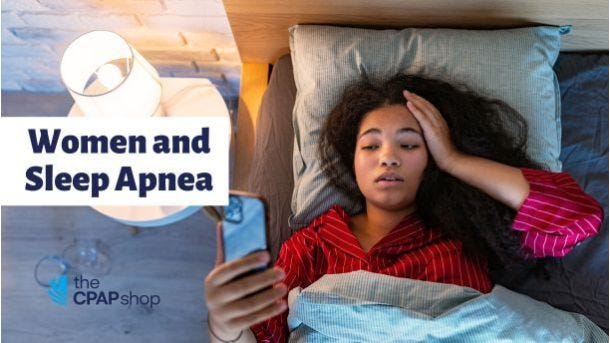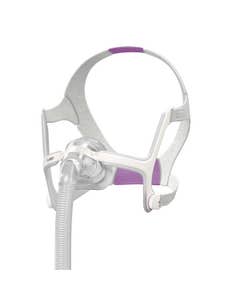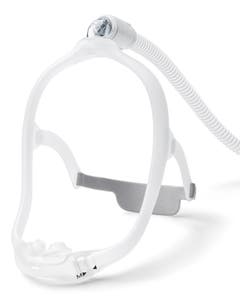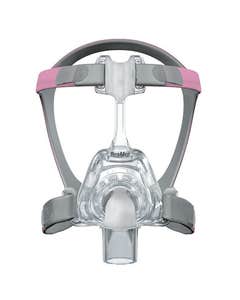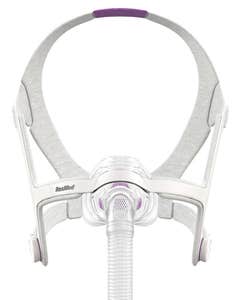Women and Sleep Apnea
Key Takeaways
- Symptoms of sleep apnea include daytime fatigue, obesity, and lack of energy, and although very prominent in men, sleep apnea can occur in women too.
- Women may be more susceptible to sleep apnea due to hormonal changes, pregnancy, weight gain, family history, and more.
- Women should look for CPAP masks with a smaller profile with a lightweight cushion and headgear to better accommodate their features.
We typically associate snoring and obstructive sleep apnea (OSA) with men, but OSA is actually more likely to go undiagnosed in women than men. And snoring is just the tip of the iceberg: women who snore are about twice as likely to have high blood pressure. They also have a higher risk of depression. Additionally, women are 33% more likely to suffer from stroke and heart disease than women who don’t snore. Continuous positive airway pressure (CPAP) breathing therapy is a proven method for controlling sleep apnea. It could make a significant difference for women suffering from sleep apnea. Leading CPAP manufacturers are taking note of apnea’s rise in women and are trying to increase awareness and added product lines specifically for women. Here are some things to keep in mind when dealing with CPAP for women.
- Just because you don’t snore doesn’t mean you don’t need CPAP. Other symptoms include: daytime fatigue, obesity, lack of energy, morning headaches, awakening gasping, or dry mouth on awakening.
- Look for masks with a smaller profile or extra small nasal pillows to allow for smaller facial features.
- Low-profile headstraps and soft wraps are more comfortable for a woman’s fit.
- To increase compliance, speak to your doctor about the best fit and model for you. Manufacturers have begun to take notice of the rise and have been designing masks specific to women.
- Become informed and knowledgeable about sleep apnea and the necessary equipment. Knowledge allows you to make the proper decisions about CPAP therapy.
While men are most likely to be diagnosed with sleep apnea, there are periods in a woman’s life when sleep apnea risks increase. Also, the typical sleep apnea symptoms detected in men are not so typical in women, which can lead to a misdiagnosis. Women need to better understand sleep apnea and what to look for when maintaining sleep health.
What is Sleep Apnea?
Sleep apnea causes the airway to close during sleep, preventing normal breathing. Frequent sleep apnea events eventually causes long-term disrupted sleep and health conditions related to sleep loss. There are two different types of sleep disorder that can be diagnosed: obstructive sleep apnea and central sleep apnea. Understanding the type of sleep apnea that you suffer from is the first step toward effective treatment.
Obstructive Sleep Apnea (OSA)
Obstructive sleep apnea is a common sleep disorder in which your breathing stops and restarts many times while you sleep. This can prevent your body from getting enough oxygen. The most common type of sleep apnea, obstructive sleep apnea, is caused by the airway periodically closing during the night, which causes gasping for breath. Frequent episodes or “apneas” eventually lead to chronic sleep deprivation.
Central Sleep Apnea (CSA)
Central sleep apnea originates in the brain rather than the airway. During sleep the brain sends the wrong signals to the airway muscles, instructing the airway to close when it should not. CPAP therapy is often ineffective for central sleep apnea treatment as it is neurological in origin.
Sleep Apnea in Women
We typically associate snoring and obstructive sleep apnea (OSA) with men, but OSA is more likely to go undiagnosed in women than men. Women who snore are about twice as likely to have high blood pressure. They also have a higher risk of depression. Additionally, women are 33% more likely to suffer from stroke and heart disease than women who don’t snore.
Symptoms of Sleep Apnea in Women
- Insomnia: While men may experience more intermittent sleep, women are more likely to experience extended insomnia because of sleep apnea.
- Fatigue: Daytime fatigue from sleep loss at night may be ignored by women who power through the day, not realizing that sleep deprivation may be impacting their health.
- Mood Disturbances: Changes in mood are often written off as hormonal in women, when these mood changes may be related to lost sleep due to sleep apnea.
Causes of Sleep Apnea in Women


Women may be more susceptible to sleep apnea due to hormonal changes, pregnancy, weight gain, family history and lifestyle factors.
Hormonal Changes
Menopause can be a peak period in a woman’s life when sleep apnea symptoms occur. Menopause can drive hormonal fluctuations. Among these hormones, estrogen and progesterone, both important for sleep regulation, may also be thrown off balance. Hormonal changes can increase sleep apnea frequency. Often sleep loss from sleep apnea can further worsen hormonal shifts, creating a vicious cycle that hinders healthy sleep.
Weight Gain/Obesity
One factor driving sleep apnea in both men and women is weight gain. As we take on extra pounds, especially as we age, more pressure is placed on the airway. Fatty tissue around the throat constricts consistent breathing while we sleep, aggravating the frequency of apneas. As weight increases, sleep apnea symptoms may become more regular and impair sleep nightly. Weight loss is one of the most effective ways for managing or possibly eliminating sleep apnea symptoms in women.
Pregnancy
Sleep apnea that occurs during pregnancy, also known as gestational sleep apnea, is caused by a combination of weight gain and hormonal changes. While gestational sleep apnea may be temporary, it still has a health impact for a woman and her baby. Gestational sleep apnea raises the risk for cesarean sections, gestational diabetes, high blood pressure, low birth weight and preterm birth.
Family History
If a woman comes from a family history of sleep apnea, it is likely she will develop symptoms, especially during pregnancy or menopause. However, family history does not make sleep apnea unavoidable. Women can focus on lifestyle changes including maintaining a healthy weight to lower their risk of sleep apnea. Often shared lifestyle patterns within families can drive sleep apnea across generations.
Lifestyle and Behavioral Factors
Changing lifestyle patterns that can cause sleep apnea can help reduce the risk. Avoid smoking and excessive alcohol consumption, as these habits can aggravate sleep apnea symptoms. Maintain an active lifestyle. Often sedentary lifestyles can increase weight gain and elevate sleep apnea symptoms.
Simple changes to sleep habits can also help. Avoid sleeping on your back, as that can cause the airway to fall closed at night. Try to maintain a consistent sleep schedule. Avoid blue light devices such as the TV or your phone close to bedtime. Maintaining a peaceful sleep environment is also helpful for reducing symptoms of sleep apnea.
Treatment for Sleep Apnea
Continuous positive airway pressure (CPAP) breathing therapy is a proven method for controlling sleep apnea. It could make a significant difference for women suffering from sleep apnea. Leading CPAP manufacturers are taking note of apnea’s rise in women and are trying to increase awareness and add product lines specifically for women. Here are some things to keep in mind when dealing with CPAP for women.
Just because you don’t snore doesn’t mean you don’t need CPAP. Other symptoms include daytime fatigue, obesity, lack of energy, morning headaches, awakening gasping, or dry mouth on awakening.
- Look for masks with a smaller profile or extra small nasal pillows to allow for smaller facial features.
- Low-profile head straps and soft wraps are more comfortable for a woman’s fit.
- To increase compliance, speak to your doctor about the best fit and model for you. Manufacturers have begun to take notice of the rise and have been designing masks specific to women.
- Become informed and knowledgeable about sleep apnea and the necessary equipment. Knowledge allows you to make the proper decisions about CPAP therapy.
The CPAP Shop would be happy to assist you in choosing CPAP products to best suit your needs. We offer the highest-quality CPAP machines and masks, and stock hundreds of accessories and supplies to help sleep apnea patients achieve comfortable and effective therapy. We even offer ResMed's "For Her" line of CPAP masks, expertly designed to better accommodate women CPAP users. Our customer care team is happy to assist you if you would like more information on any products we offer. Give us a call at 866-414-9700 or visit us online today!



